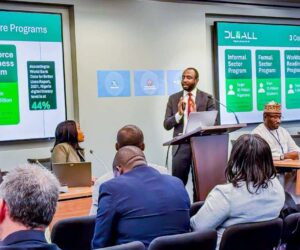Google has solidified its position as the largest shareholder in TeraWulf, a U.S.-based Bitcoin mining and data centre operator, securing a 14% stake in the deal. This move ties Google to a $3.2 billion financial backstop supporting a 10-year colocation lease agreement between TeraWulf and AI infrastructure provider Fluidstack.
The partnership underscores a growing trend of tech giants pivoting toward AI and high-performance computing (HPC) infrastructure, leveraging the robust energy systems of cryptocurrency miners.
TeraWulf, founded in 2021, initially focused on sustainable Bitcoin mining. However, the April 2024 Bitcoin halving slashed mining rewards to 3.125 BTC per block, squeezing profitability. This prompted TeraWulf to diversify into AI and HPC hosting. The company’s Lake Mariner data centre in New York, powered by zero-carbon energy, has become a cornerstone for this transition.

The agreement with Fluidstack, an AI cloud platform serving clients like Mistral AI, is a game-changer. It includes a 10-year lease for over 200 MW of critical IT load, with a new 160 MW facility, CB-5, set to begin operations in late 2026. The deal is projected to generate $6.7 billion in revenue, potentially reaching $16 billion with lease extensions.
Google’s $3.2 billion backstop
Google’s role is pivotal. The tech giant increased its financial backstop from $1.8 billion to $3.2 billion, securing warrants for over 73 million TeraWulf shares. This boosted Google’s stake from 8% to 14%, making it TeraWulf’s largest shareholder.
The backstop ensures Fluidstack’s lease obligations are met. If Fluidstack fails to meet its financial commitments, Google will cover the shortfall, though these funds are not accessible to TeraWulf for corporate debt or Bitcoin mining.
Kerri Langlais, TeraWulf’s Chief Strategy Officer, called Google’s investment a “powerful validation” of the company’s zero-carbon infrastructure. She emphasised the scalability of Lake Mariner, which now boasts over 360 MW of contracted IT load, positioning it as one of the largest HPC campuses in the U.S.
Why Bitcoin miners are pivoting to AI
The shift from Bitcoin mining to AI infrastructure is a broader industry trend. A 2024 VanEck report estimates that redirecting 20% of Bitcoin miners’ energy to AI and HPC by 2027 could yield $13.9 billion in additional annual profits over 13 years.


TeraWulf’s move aligns with this forecast, balancing short-term Bitcoin mining cash flow with long-term AI-driven revenue. The company plans to maintain, but not expand, its mining operations, focusing instead on “execution: building, hosting, and delivering” for partners like Google and Fluidstack.
TeraWulf’s Lake Mariner campus is purpose-built for AI workloads. It features dual 345 kV transmission lines, closed-loop water cooling, and ultra-low-latency fibre connectivity. These attributes make it ideal for high-density, liquid-cooled AI computing, attracting partners like Fluidstack.
The announcement sent TeraWulf’s stock (WULF) soaring. On August 18, shares rallied 17%, peaking at $10.57 from a previous close of $8.97. By day’s end, the stock settled at $9.38, with a 1.28% after-hours dip. Since the Fluidstack deal was first disclosed on August 14, TeraWulf’s stock has surged over 72%, reflecting strong investor confidence.
Google’s investment in TeraWulf signals deeper involvement in the intersection of crypto and AI infrastructure. The company’s approach, backing sustainable, high-performance computing without directly engaging in crypto mining, sets a model for other tech giants.


TeraWulf’s CEO, Paul Prager, highlighted the deal’s significance, stating it “unites world-class capital and compute partners” to deliver next-generation AI infrastructure. Fluidstack’s co-founder, César Maklary, echoed this, emphasising their shared commitment to scalable AI solutions.
TeraWulf and Fluidstack are already discussing further capacity expansions, signalling strong demand for AI infrastructure. The CB-5 facility’s construction, estimated at $8–$10 million per MW, underscores TeraWulf’s aggressive growth strategy.
With Google’s backing and a robust revenue pipeline, TeraWulf is poised to lead in the AI data centre market, leveraging its zero-carbon infrastructure to meet global computing demands.
As the AI revolution accelerates, TeraWulf’s pivot from Bitcoin mining to AI hosting, backed by Google’s financial muscle, marks a defining moment. The partnership not only validates TeraWulf’s infrastructure but also highlights the evolving synergy between crypto and AI industries.








